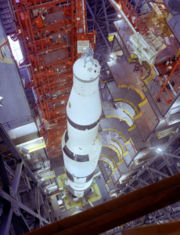Difference between revisions of "Colonising Space/Open design making space truly accessible"
| Line 1: | Line 1: | ||
[[Image:Saturn-V-in Vehicle Assembly Building.jpg|180px|right]] Accessing space is a difficult business. It is expensive, dangerous and everything has to be got exactly right. The only likely viable way to overcome all these issues and make it available to a wide number of people is to make it completely [[Open collaborative design|Open and collaborative]]. The plans, designs and processes need to be totally transparent, and anyone with the necessary expertise, motivation and imagination should have the opportunity to contribute. These people will be the force to actually make it happen. | [[Image:Saturn-V-in Vehicle Assembly Building.jpg|180px|right]] Accessing space is a difficult business. It is expensive, dangerous and everything has to be got exactly right. The only likely viable way to overcome all these issues and make it available to a wide number of people is to make it completely [[Open collaborative design|Open and collaborative]]. The plans, designs and processes need to be totally transparent, and anyone with the necessary expertise, motivation and imagination should have the opportunity to contribute. These people will be the force to actually make it happen. | ||
| − | Making the colonisation of | + | Making the colonisation of space a truly global collaborative process is an amazing opportunity to bring people and cultures together. Not a project of any one nation but a project of humanity with contributions from everywhere. The culture of openness is also the perfect way to start the spread of life away from Earth - it is the right attitude and the best way for people to get the most out of each other. |
| − | + | Space exploration under the auspices of governments has proven too inefficient and expensive. Under government control, the cost of launching a kilogram of material into space has been many thousands of dollars. This cost does not come from materials, or fuel, or anything else inherent in the technology; it comes from the inefficiency and expense of a development pipeline that requires every part to be built and inspected by hand. | |
| − | Ultimately the possibility of | + | Commercial reasons alone are not the right basis for colonising space and the lesser efficiency of that model over an open culture would likely only ever make it a niche activity with potential for conflict. It is due to the lack of commercial viability that no-one has left low-earth orbit since the Apollo program. But Open culture does not need to revolve around conventional economics. |
| + | |||
| + | Ultimately the possibility of space colonisation is a matter of energy, material, information and intelligence — and all four are in reality [[Fundamental resources|massively abundant]]. Creating the infrastructure for a space programme to the scale necessary for launching even a small fraction of the population into space is likely to require the existence of [[advanced automation|advanced automation]]. | ||
Revision as of 07:31, 22 May 2012
Accessing space is a difficult business. It is expensive, dangerous and everything has to be got exactly right. The only likely viable way to overcome all these issues and make it available to a wide number of people is to make it completely Open and collaborative. The plans, designs and processes need to be totally transparent, and anyone with the necessary expertise, motivation and imagination should have the opportunity to contribute. These people will be the force to actually make it happen.Making the colonisation of space a truly global collaborative process is an amazing opportunity to bring people and cultures together. Not a project of any one nation but a project of humanity with contributions from everywhere. The culture of openness is also the perfect way to start the spread of life away from Earth - it is the right attitude and the best way for people to get the most out of each other.
Space exploration under the auspices of governments has proven too inefficient and expensive. Under government control, the cost of launching a kilogram of material into space has been many thousands of dollars. This cost does not come from materials, or fuel, or anything else inherent in the technology; it comes from the inefficiency and expense of a development pipeline that requires every part to be built and inspected by hand.
Commercial reasons alone are not the right basis for colonising space and the lesser efficiency of that model over an open culture would likely only ever make it a niche activity with potential for conflict. It is due to the lack of commercial viability that no-one has left low-earth orbit since the Apollo program. But Open culture does not need to revolve around conventional economics.
Ultimately the possibility of space colonisation is a matter of energy, material, information and intelligence — and all four are in reality massively abundant. Creating the infrastructure for a space programme to the scale necessary for launching even a small fraction of the population into space is likely to require the existence of advanced automation.
